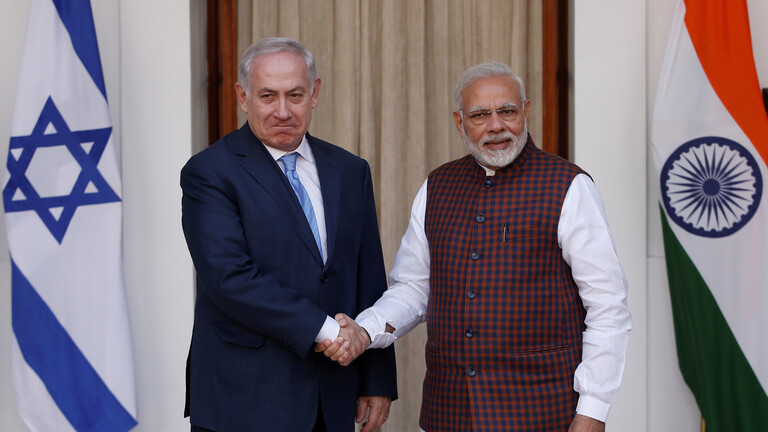Following the ‘Operation Al-Aqsa Storm’ conducted by Hamas in the Gaza Strip on October 7th, a majority of countries in the global South opposed Israeli military operations in the region. However, India took a different stance by expressing support for Israel. Prime Minister Narendra Modi, immediately after ‘Operation Al-Aqsa Storm,’ conveyed solidarity with Israel and condemned Hamas. This support preceded U.S. President Joe Biden’s endorsement of Israel, leading to questions about India’s reasons for aligning with Israel in the ongoing conflict.
India’s supportive stance on Israeli military operations in Gaza, in contrast to the open criticism from Russia and China, can be attributed to several reasons, including:
1. Strengthening ties with Tel Aviv: Under the leadership of Narendra Modi, Indian-Israeli relations have witnessed a significant boost. In 2017, Modi became the first Indian Prime Minister to visit Israel, marking the initiation of diplomatic relations established in 1992. Israel holds the position of being India’s largest arms supplier, contributing to 46% of Israeli arms exports, encompassing drones, radars, and missile systems.
Additionally, the two nations engage in collaborative defense research and development projects. Between 2000 and 2010, bilateral defense trade between India and Israel was estimated at approximately $10 billion. Modi has actively contributed to the growth of economic relations between Israel and India, as reflected in the trade reaching $10.1 billion in the fiscal year 2022-2023, according to data from the Indian Embassy in Israel.
2. The Hindu Nationalist Identity of the Bharatiya Janata Party: Members of India’s ruling party, the Bharatiya Janata Party (BJP), interpret the Israel-Hamas conflict through the lens of Hindu nationalist identity. They perceive Israel as facing an existential threat similar to what they believe India, with its ethnic national majority, confronts in terms of terrorism.
A BJP minister under Modi’s leadership cautioned that India “may face the situation Israel is facing today if it does not stand against politically motivated extremism.” The ruling Indian party draws parallels between Hamas’ attacks on Israel and the situation in India before Modi was elected as Prime Minister in 2014. In a tweet, they claimed that “what Israel is facing today, India endured between 2004 and 2014.” Some right-wing Hindu nationalists even gathered outside the Israeli embassy in New Delhi, urging to join Israeli forces in fighting the “common enemy” shared by Israel and India.
This narrative has strengthened Indian collaboration with Israeli security experts and the acquisition of specialized Israeli devices and programs for counter-terrorism and security purposes. This support enhances the Indian government’s capabilities in dealing with political opposition and minorities. As Modi leads the Bharatiya Janata Party towards the 2024 general elections, his backing of Israel in the Gaza conflict aims to boost his popularity among conservative voters. He positions himself as a strong advocate for the Hindu majority in India, committed to combating terrorism domestically and supporting like-minded partners abroad.
3. Strengthening Partnership with the United States: In contrast to many countries in the global South and the BRICS group, India has been actively working to strengthen its ties with the United States. This aligns with the American effort to contain the rise of China and formalize the Quadrilateral Security Dialogue. These actions have elevated India’s position within the security framework orchestrated by Washington in the Indo-Pacific region, enhancing its role in the American strategy to counter Chinese global influence, both globally and in the Middle East.
Given India’s wavering stance on the Russian-Ukrainian war, the Indian government may have shifted from explicitly condemning Hamas after ‘Operation Al-Aqsa Storm’ on October 7th of the previous year to sending a message to the United States about its willingness to support a strategic ally of Washington in the region. This shift aims to reduce tensions in the Indian-American relationship, as Modi’s government adopts policies that diverge from the vision of the U.S. administration, such as their stance on the Russian-Ukrainian war.
4. Unstable Relations with Iran: While India has broadened the scope of its bilateral cooperation with countries with which it shares strategic ties, such as Israel, its relations with powers supporting Hamas are, in contrast, unstable. For instance, New Delhi reduced its level of trade relations with Iran in compliance with U.S. sanctions on Tehran due to its nuclear program. India also appears hesitant to finalize the development project of the Chabahar Port, which could facilitate access to markets in Central Asia without transiting through Pakistani territory.
Interconnected Calculations
Historically, Indian-Israeli relations were strained, as India’s foreign policy institution sympathized with Arab issues due to shared anti-colonial sentiments. New Delhi’s political leadership also remained sensitive to the largest religious minority in India, the Muslims. However, since Modi came to power in 2014, New Delhi has significantly reduced its support for the Palestinian cause, even while publicly maintaining its commitment to it.
For instance, in 2015 and 2016, India abstained from voting on United Nations resolutions that could have referred Israel to the International Criminal Court for alleged war crimes during the Israeli military operation in Gaza, known as “Operation Protective Edge,” which began on July 8, 2014.
India’s support for Israel is largely attributed to the realistic political considerations adopted by the current Indian government. Additionally, there is alignment between Modi and Israeli Prime Minister Benjamin Netanyahu. New Delhi sees its multifaceted relationship with Tel Aviv as enhancing its influence and presence in the Middle East. Furthermore, India lacks sympathy for Hamas or its supporters.
However, after a period of openly declaring support for Israeli military operations in Gaza, India has begun adopting a somewhat balanced stance to safeguard its interests in the Middle East. This shift comes amid growing official and public Arab anger over continued Israeli military attacks against Palestinian civilians in Gaza. India has affirmed its support for a two-state solution and pledged humanitarian aid to Gaza, fearing that Israeli military operations in Gaza could escalate into a regional war, threatening Indian investments with Israel and its partners in the region. Of greater concern is the potential revival of terrorist threats within India, especially with the upcoming general elections next year.


